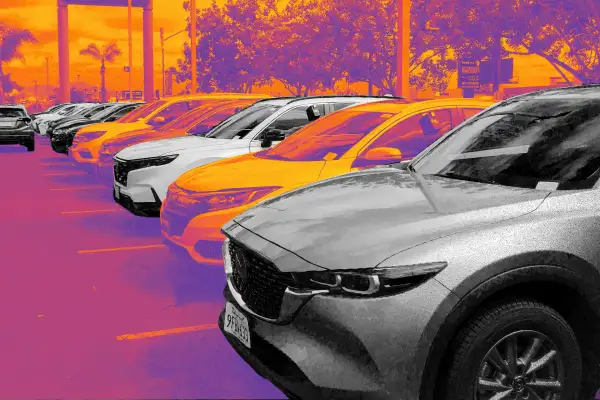Car Dealerships Are Running 'Tariff Sales' as Shoppers Scramble to Buy

Car shoppers are moving up purchases in an attempt to get ahead of price increases due to tariffs on imported vehicles and parts. Many dealerships are promoting “tariff sales” to capitalize on the rush and move inventory before prices rise.
Two weeks ago, the U.S. slapped a 25% tariff on auto imports, and on May 3, additional tariffs on car parts are set to kick in. These tariffs would push up manufacturing costs for virtually every vehicle, including those assembled in the U.S., because currently, every car includes some foreign parts. According to a recent report from Anderson Economic Group, tariffs could add $4,000 to $10,000 to the price tags of most vehicles — and even more for EVs. Cars imported before the tariffs took place are not affected, sending consumers on a car-shopping spree.
New data from Cox Automotive shows vehicle sales have shot up in recent weeks and are moving 22% faster than a year ago. That's brought the available inventory at car dealerships down to the lowest level in nearly two years.
The auto industry measures vehicle inventory with a metric called "days' supply" that tracks how long it would take to sell all existing inventory at the current sales pace. The days' supply number fell 12% in the latest week to 61.7 days, which is the lowest since summer 2023.
"The decline in days' supply was one of the largest drops we've seen in several years." Jonathan Smoke, chief economist at Cox Automotive, said in a recorded update on Tuesday.
Several other factors — including the arrival of tax refund payments and a recent drop in auto loan rates — could be contributing to higher car sales. However, the "tariff pull ahead" effect, as Cox described it, seems to be the main reason for higher sales.
"Tax refund season is reaching an end, but sales of new vehicles are accelerating as consumers move to buy before the pre-tariff inventory is exhausted," Smoke said. "As prices rise, buyers are likely to pull back."
While there's still a roughly "normal" amount of vehicle inventory out there, things could change fast if the president doesn't give automakers a reprieve from tariffs (which he's considering).
Are tariff sales worth shopping?
The tariff dynamics can be complicated for shoppers to figure out. Pre-tariff inventory, especially imported cars in tight supply, is a hot commodity. Typically, if an imported car is in high demand, you might expect dealers to want top dollar. However, many dealerships are advertising tariff sales and pre-tariff pricing.
Keep in mind that some of these tariff "offers" are nothing more than savvy marketing. That's evident in financing deals. According to Cox's data, the share of vehicle financing with 0% APRs fell to the lowest level since 2019 in March and dropped even lower in April. Also, the share of sub-3% APR financing is at the lowest level in a year and a half, Smoke said. "Manufacturers are just not aggressive with financing offers with tighter supply," he said.
While car commercials urging you to shop pre-tariff inventory now are intended to make shoppers feel rushed, it's important to take your time with any big purchase, especially a car. The good news is that roughly half of all cars sold in the U.S. are assembled in America, which means they're less likely to be directly affected by tariffs. While prices could rise, it's still anyone's guess how much and how universal the increases would be. Take the time you need to make the best car choice for your needs and budget.
More from Money:
Want to Avoid Auto Tariffs? Here's How to Find Out if a Car Is Made in America
